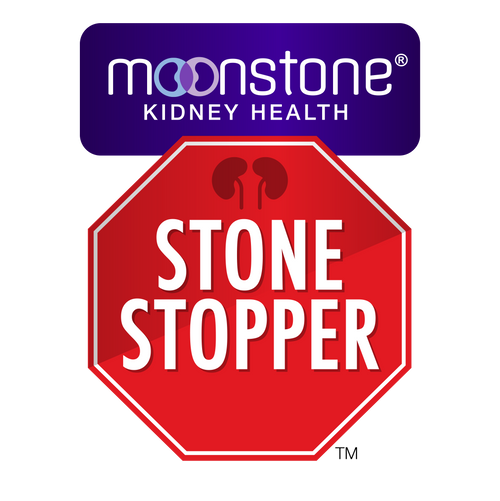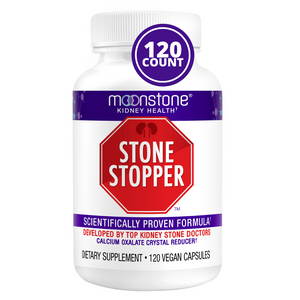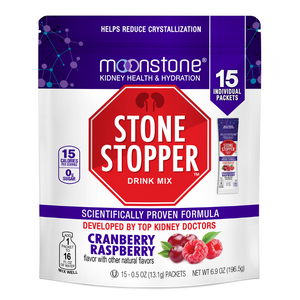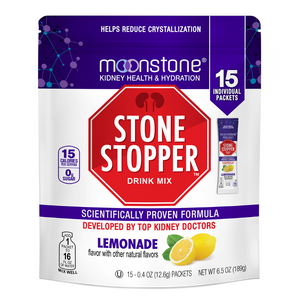So you might have heard of the "kidney stone diet" but have you ever heard of the renal diet? This is your ultimate guide on how to prevent kidney stones with a renal diet.
If you have, you might have heard that it's a more restrictive kind of kidney stone diet. Created by doctors to help treat various stages of kidney disease, the renal diet can be more limiting than the average kidney stone protocol.
For most of us though, a full renal diet isn't necessary. To prevent kidney stones, we can take supplements like Moonstone Stone Stopper™ packed with alkali citrate, watch our salt intake, improve hydration and water intake, increase our vegetables, fruits, whole grains, and limit sugar-sweetened foods and drinks.
That being said, a renal diet does have a few wellness gems that everybody looking to improve their overall kidney health should consider. Let's explore!
What's a renal diet?
A renal diet promotes healthy kidney function for those suffering from kidney disease. As you may know, your kidneys are bean-shaped organs below your ribcage, on either side of your spine. They perform vital functions like:
- Filtering your blood.
- Removing waste through your urine.
- Maintaining fluid balance in your body.
When a person suffers from kidney disease, their kidneys can’t filter blood the way they usually would. This means sodium, potassium, phosphorus, and protein byproducts can build up in our blood causing more damage to our kidneys. (This is why upping your daily dose of alkali citrate is an easy and incredibly important component of any kidney friendly diet plan.)
A true renal diet is low in protein, sodium, potassium, and phosphorus. This protects the kidneys from working too hard and our bodies from holding onto too much fluid. A person's daily limit of these things will depend on their doctor's recommendation and the extent of their kidney disease.
What do you eat on a renal diet?
Fresh whole foods are best because they are naturally lower in sodium. Sodium is a mineral found in salt (sodium chloride). It’s widely used in food preparation to build a vibrant taste profile, but sadly also increases the amount of calcium in our urine.
Before thinking you have to eat bland foods for life in order to prevent kidney stones, with a little planning, it’s actually easy to prepare meals that are yummy and nutritious. With a variety of lean protein foods, low potassium fruits, vegetables, and whole grains, you'll find that a renal diet can be quite fulfilling.
Protein choices
Protein is essential for healthy kidneys, and general wellness, but you should limit your consumption if you're hoping for a preventative kidney stone solution. Too much protein can cause your kidneys to have trouble removing excess waste. The general rule of thumb is to eat a small serving of protein at each meal, but your doctor or dietician can you tell the exact amount.
Some good "kidney friendly" protein options include:
- Skinless chicken or turkey.
- Fish or seafood.
- Lean beef like sirloin or tenderloin.
- Eggs.
- Tofu and beans, like kidney beans or lentils. Note that these are higher in potassium and phosphorus, so you may need to limit the portion size.
Fruit and vegetable options
Many fruits and vegetables are also high in potassium, and if you're actively fighting a kidney health issue, you might have to avoid them or eat small portions. (Again, ask your doctor or renal dietician.)
Still, there are many delicious lower potassium fruits and vegetable options to consider:
- Apples
- Blackberries
- Blueberries
- Cherries
- Grapes
- Pineapple
- Strawberries
- Tangerines
- Green beans
- Cabbage
- Cucumbers
- Eggplant
- Kale
- Lettuce
- Sweet peppers
- Zucchini
Grain and starch decisions
Whole grains contribute fiber, vitamins, and minerals, but many are high in potassium. For those not dealing with acute kidney complications, whole grains are a great addition to your diet. However, if you're actively working to heal a kidney health issue, you may need to limit your portion sizes and how often you eat whole grains as well.
Some healthy, lower potassium options include:
- Barley
- Buckwheat
- Bulgur
- Wild rice
- Unsalted popcorn
Ironically, in a world where often all white starches get vilified, white bread, pasta, or rice may be the better choice. These are all lower in potassium than their whole-grain counterparts, and your doctor will be able to help you make the best decision for your case.
Renal Diet: Foods to Avoid
You've probably heard it before but we all know that overly processed foods aren't the best for us. Among other things, their nutrition profile is usually very high in sodium. The best way to gauge if something would be a good fit is to read the nutrition facts label. Choose foods with less than 240 mg of sodium per serving to be in the optimum range.
If you're on a strict renal diet, you should avoid or limit these high sodium foods:
- Chips, crackers, pretzels, and salted popcorn.
- Canned soups or stews.
- Pickles, olives, and pickled vegetables or relishes.
- Deli meats and cheeses (unless they say “low sodium”), hot dogs, sausages, and bacon.
- Packaged meals like frozen dinners or mac and cheese.
- Packaged, seasoned rice or noodles.
- Frozen, seasoned meats or fish like chicken strips or fish sticks.
Also, limit these high potassium foods:
- Apricots.
- Bananas.
- Cantaloupe.
- Dried fruits.
- Honeydew.
- Kiwi.
- Nectarines.
- Oranges.
- Broccoli.
- Carrots.
- Parsnips.
- Potatoes (white and sweet).
- Spinach.
- Tomatoes (and tomato sauce or juice).
- Winter squash.
- Nuts and nut butters.
- Seeds like sunflower or pumpkin seeds.
- Chocolate.
- Molasses.
- Granola and bran cereals.
- Salt substitutes that contain potassium.
If you're being extra attentive to the renal diet protocol, or looking to help stop the formation of kidney stones, you might also want to limit your portions of the following high-phosphorus foods:
- Dairy foods like milk, yogurt, cheese, or ice cream.
- Dried beans like kidney, black, or pinto beans.
- Mushrooms.
- Cocoa.
- Beer.
- Dark soft drinks like colas or root beers.
Consulting a dietitian can help you to navigate a renal diet without sacrificing taste. They can also teach you how to count the milligrams of sodium, potassium, and phosphorus in your favorite meals to make modifications where possible.
Renal Diet & Kidney Stones
One of the benefits of exploring a renal diet is that by doing so, you'll also be adopting kidney stone prevention habits: Drinking more water, eating less sodium, moderate exercise, etc. Lifestyle and diet changes are a perfect way to ease discomfort from kidney stones and to help prevent further kidney related health complications.
But sometimes making lifestyle changes can be daunting and difficult to start. The simplest way to get started on preventing and dissolving kidney stones is to begin taking a daily dose of alkali citrate.
People suffering from chronic kidney stones can use Moonstone Stone Stopper™ for its daily dose of alkali citrate to prevent further stones from forming. Available in capsules and powder beverages in a variety of delicious flavors, adding Moonstone's 30mEq dose of alkali citrate (from citrate salts) to your daily routine is easier than ever.
Moonstone is a gentle alternative and the first OTC supplement doctor designed to address kidney stone crystallization. In addition to its active ingredients, Moonstone has no added sugar, is low in sodium and an excellent source of magnesium and vitamin B6. Moonstone may also appeal to people seeking clean label products because it's free of wheat, fat and soy.
Get started on your renal diet exploration and #TryMoonstone - Your kidneys will thank you!







1 comment
To the moonstonenutrition.com Admin, identical in this article: Link Text